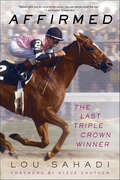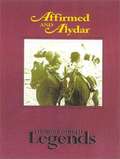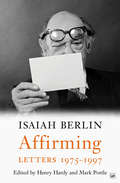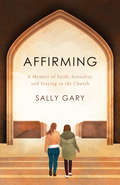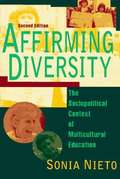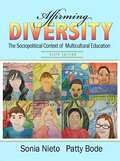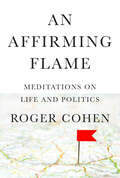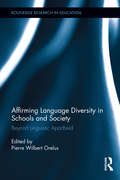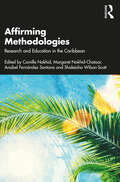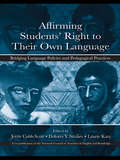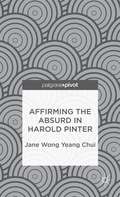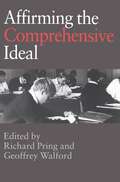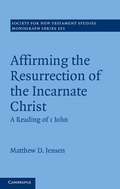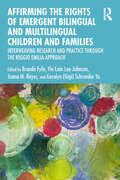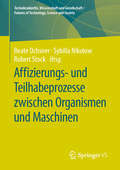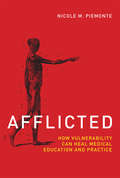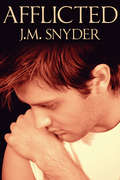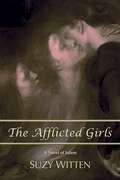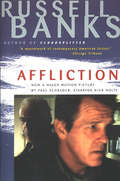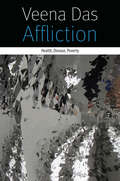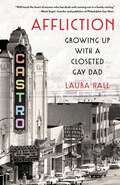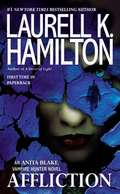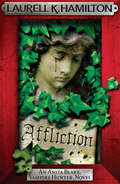- Table View
- List View
Affirmed: The Last Triple Crown Winner
by Lou SahadiTelling the story that transcended the Thoroughbred racing world, Lou Sahadi's Affirmed finally gives this courageous horse his due.In 1978, racing fans witnessed the culmination of an epic rivalry when a horse named Affirmed faced off against the celebrated Alydar and emerged victorious. In this long-overdue biography of Affirmed, veteran sportswriter Lou Sahadi captures the life and spirit of this indomitable horse who twice earned Horse of the Year honors and placed #12 on the Blood-Horse list of "Top 100 Racehorses of the 20th Century."Sahadi chronicles how the initially docile chestnut colt began his stellar rise in 1977. Entering the 1978 season, many experts speculated that Alydar, the latest prize product from the storied Calumet Farm, would prove himself the better horse. Yet under trainer Laz Barrera's careful strategy and the eighteen-year-old reigning Sports Illustrated Sportsman of the Year jockey Stevie Cauthen, Affirmed bested his rival and mesmerized even the most casual of sports fans.Drawing on interviews with Cauthen, some members of the Wolfson family, and many more, Sahadi delivers fascinating subplots, including that of jockey Laffit Pincay, Jr., and owner Louis Wolfson, the Wall Street financier whose federal conviction led to the resignation of a Supreme Court justice."Sahadi tells the dramatic story of Affirmed and his young jockey . . . showing in detail how the ‘underdog' Affirmed won the Triple Crown." —New York Post ("Required Reading" pick)
Affirmed and Alydar: Racing's Greatest Rivalry (Thoroughbred Legends #15)
by Timothy T. CappsThe greatest rivalry in modern racing history began with little fanfare on June 15, 1977. The more experienced Affirmed defeated Alydar, who was making his racing debut in the Youthful Stakes at Belmont Park. In nine subsequent meetings, Affirmed got the better of Alydar six times, often by just inches. Their meetings, especially during the Triple Crown season of 1978, became the stuff of racing lore. Affirmed claimed the Triple Crown, but Alydar tested him to the limits each time in stirring stretch drives that left onlookers limp. Indeed, many racing historians consider their Belmont Stakes to be the greatest race of the 20th century. To tell one’s story is to tell the other’s, so closely intertwined are the lives of Affirmed and Alydar. Author Tim Capps, who witnessed many of the Affirmed-Alydar races, chronicles their early years, first encounters, and epic clashes. He also tells the stories of the people who raised, trained, and rode these titans. Affirmed was bred in Florida by financier Louis Wolfson, trained by the legendary Laz Barrera, and ridden by Steve Cauthen, known as “The Kid.” Alydar entered life on the historic grounds of Calumet Farm in Lexington, Kentucky, the last great horse of the old Wright regime. Trained by the young John Veitch, Alydar would have been a Triple Crown winner in any other year. As a stallion, Alydar surpassed his nemesis although Affirmed found surprising success as a sire of turf horses.
Affirming: Letters 1975-1997
by Isaiah Berlin‘IB was one of the great affirmers of our time.’ John Banville, New York Review of BooksThe title of this final volume of Isaiah Berlin’s letters is echoed by John Banville’s verdict in his review of its predecessor, Building: Letters 1960–75, which saw Berlin publish some of his most important work, and create, in Oxford’s Wolfson College, an institutional and architectural legacy. In the period covered by this new volume (1975–97) he consolidates his intellectual legacy with a series of essay collections. These generate many requests for clarification from his readers, and stimulate him to reaffirm and sometimes refine his ideas, throwing substantive new light on his thought as he grapples with human issues of enduring importance.Berlin’s comments on world affairs, especially the continuing conflict between Israel and the Palestinians, and the collapse of Communism, are characteristically acute. This is also the era of the Northern Ireland Troubles, the Iranian revolution, the rise of Solidarity in Poland, the Chernobyl nuclear disaster, the fall of the Berlin Wall, Ayatollah Khomeini’s fatwa against Salman Rushdie, the spread of Islamic fundamentalism, and wars in the Falkland Islands, the Persian Gulf and the Balkans. Berlin scrutinises the leading politicians of the day, including Reagan, Thatcher and Gorbachev, and draws illuminating sketches of public figures, notably contrasting the personas of Alexander Solzhenitsyn and Andrey Sakharov. He declines a peerage, is awarded the Agnelli Prize for ethics, campaigns against philistine architecture in London and Jerusalem, helps run the National Gallery and Covent Garden, and talks at length to his biographer. He reflects on the ideas for which he is famous – especially liberty and pluralism – and there is a generous leavening of the conversational brilliance for which he is also renowned, as he corresponds with friends about politics, the academic world, music and musicians, art and artists, and writers and their work, always displaying a Shakespearean fascination with the variety of humankind.Affirming is the crowning achievement both of Berlin’s epistolary life and of the widely acclaimed edition of his letters whose first volume appeared in 2004.
Affirming: A Memoir of Faith, Sexuality, and Staying in the Church
by Sally GaryWhat is it like to discover that something you&’ve believed all your life might be wrong? Sally Gary knew since her early adulthood that she was attracted to women. But as a devoted Christian, she felt there was no way to fully embrace this aspect of her identity while remaining faithful. Now, as she prepares to marry the love of her life, she&’s ready to speak out about why—and how—her perspective changed. In this deeply personal memoir, Sally traces the experiences, conversations, and scriptural reading that culminated in her seeing her sexuality as something that made sense within the context of her faith—not outside of it or in opposition to it. Along the way, she addresses specific aspects of her journey that will resonate with many other gay Christians: the loneliness and isolation of her previously celibate life, the futile attempts she made to resist or even &“change&” her sexual orientation, and the fear of intimacy that followed a lifetime of believing same-sex relationships were sinful. Sally&’s story—one of heritage, learning, courage, and love—is written especially for the generations of LGBTQ Christians after her who are questioning whether they can stay part of the church they call home. It&’s a resounding reminder that, just like Sally&’s own heart, things can change, and sometimes, when we earnestly search for the truth, we find it in the most unexpected places.
Affirming Diversity: The Sociopolitical Context of Multicultural Education (2nd edition)
by Sonia NietoCase studies illustrating a conceptual framework of multicultural education in the US, and the implications of diversity for teaching and for learning.
Affirming Diversity: The Sociopolitical Context Of Multicultural Education
by Sonia Nieto Patty BodeSonia Nieto and Patty Bode look at how personal, social, political, cultural, and educational factors affect the success or failure of students in today's classroom. Expanding upon the popular case-study approach, Affirming Diversity: The Sociopolitical Context of Multicultural Education examines the lives of real students who are affected by multicultural education, or the lack of it. This social justice view of multicultural education encourages teachers to work for social change in their classrooms, schools, and communities.
An Affirming Flame: Meditations on Life and Politics
by Roger Cohen&“For more than forty years Roger Cohen has ventured to every corner of the earth to chronicle the great upheavals of our age, but he&’s never lost sight of what really matters: love, hope, and all the mysteries of the human heart. Here, in this collection of columns that will take you from the streets of Kyiv to an execution chamber in Alabama, you can read him at his best.&”—Dexter Filkins, best-selling author of The Forever WarA collection of the finest New York Times columns written by Roger Cohen over more than a decade, accompanied by an original, twenty-thousand-word essay on the state of the worldThe countless readers who followed Roger Cohen&’s column and mourned its end responded above all to what they saw as the marriage in his writing of head and heart. That tenor permeates An Affirming Flame.During his twelve years as a columnist, Cohen aimed to hold power to account at home and abroad, in the name of freedom, decency, pluralism, and the importance of truth and dissent in open societies. He watched with alarm as the outside threat of 9/11 morphed into the internal threat of January 6. This time, the assailants were not jihadi terrorists; they were American white supremacists and seditionists convinced of American decadence but unable to see that they personified it. The threat to American democracy is clear.Cohen dissects this ominous American fracture. He explores themes of displacement, belonging, and his own imperiled craft of journalism. His examination of the rising tide of authoritarian rule takes him to China, and in Kyiv he sees the devastating impact of Vladimir Putin's Russian nationalism. With its trenchant consideration of the plight of refugees, COVID-19, the Israeli-Palestinian conflict, and the war in Afghanistan, Cohen's writing reflects his belief in the unquenchable human quest for dignity.He captures the fight to defend America&’s openness, democratic institutions, and ideals against the rising tide of retrogression, division, and assault on truth. This struggle, as Cohen writes, is also the world&’s. It is inseparable from the battle to save humanity from the creeping autocracy of the twenty-first century. As he writes, &“On lies is tyranny built.&”
Affirming Language Diversity in Schools and Society: Beyond Linguistic Apartheid (Routledge Research in Education)
by Pierre Wilbert OrelusLanguage is perhaps the most common issue that surfaces in debates over school reform, and plays a vital role in virtually everything we are involved. This edited volume explores linguistic apartheid, or the disappearance of certain languages through cultural genocide by dominant European colonizers and American neoconservative groups. These groups have historically imposed hegemonic languages, such as English and French, on colonized people at the expense of the native languages of the latter. The book traces this form of apartheid from the colonial era to the English-only movement in the United States, and proposes alternative ways to counter linguistic apartheid that minority groups and students have faced in schools and society at large. Contributors to this volume provide a historical overview of the way many languages labeled as inferior, minority, or simply savage have been attacked and pushed to the margins, discriminating against and attempting to silence the voice of those who spoke and continue to speak these languages. Further, they demonstrate the way and the extent to which such actions have affected the cultural life, learning process, identity, and the subjective and material conditions of linguistically and historically marginalized groups, including students.
Affirming Methodologies: Research and Education in the Caribbean
by Camille NakhidAffirming Methodologies: Research and Education in the Caribbean centres local and indigenous ways of knowing in research and education praxis in the Caribbean. The research methodologies and pedagogies are presented in this book within an Affirming Methodologies framework. They bring forward localized epistemologies whereby Caribbean ways of being and knowing are affirmed, and the expected western hierarchies between researcher and researched are removed. The chapters present approaches to knowledge construction and knowledge sharing based on practices, lived experiences, traditions, language patterns, and rituals of Caribbean communities. The importance of an Affirming Methodologies approach is demonstrated, and the characteristics of culturally affirming research methodologies and pedagogies in diverse environments including Cuba, Trinidad and Tobago, Jamaica and the Caribbean diaspora in Aotearoa New Zealand and Canada are explored and presented. Grounded on an understanding of the authors’ Caribbean positionality, ontological distinctions within the Caribbean research context are considered. This book moves forward from a decolonizing methodology approach, and, as such, the chapters are written, not in opposition to, or tested against Eurocentric approaches to research, but deeply rooted in a Caribbean ethos. This book will engage researchers (both qualitative and quantitative), postgraduate students, academics, practitioners, policymakers, community workers, and lay persons who seek to employ culturally relevant local and indigenous research approaches in their work. Each chapter offers practical suggestions on the 'how' of research practice, making them accessible, relevant, and flexible for novice and seasoned researchers alike.
Affirming Students' Right to their Own Language: Bridging Language Policies and Pedagogical Practices
by Jerrie Cobb Scott Dolores Y. Straker Laurie KatzA Co-publication of the National Council of Teachers of English and Routledge. How can teachers make sound pedagogical decisions and advocate for educational policies that best serve the needs of students in today’s diverse classrooms? What is the pedagogical value of providing culturally and linguistically diverse students greater access to their own language and cultural orientations? This landmark volume responds to the call to attend to the unfinished pedagogical business of the NCTE Conference on College Composition and Communication 1974 Students’ Right to Their Own Language resolution. Chronicling the interplay between legislated/litigated education policies and language and literacy teaching in diverse classrooms, it presents exemplary research-based practices that maximize students' learning by utilizing their home-based cultural, language, and literacy practices to help them meet school expectations. Pre-service teachers, practicing teachers, and teacher educators need both resources and knowledge, including global perspectives, about language variation in PreK-12 classrooms and hands-on strategies that enable teachers to promote students’ use of their own language in the classroom while also addressing mandated content and performance standards. This book meets that need. Visit http://www.ncte.org for more information about NCTE books, membership, and other services.
Affirming the Absurd in Harold Pinter
by Jane Wong Yeang ChuiUsing Martin Esslin's invention - the Theatre of the Absurd - to examine Pinter's works, Wong brings the complexities and intricacies of the plays to the forefront, provoking readers and audiences to reconsider and problematize more conventional studies of his plays.
Affirming the Comprehensive Ideal
by Richard PringExamines the ideals which lay behind the development of comprehensive schools. Written by 14 British educationalists, this text considers the evidence and suggests how further progress might be made within the moral framework of secondary education for all, irrespective of background or ability. The text includes an afterword by the Rt Hon John Prescott, MP, Deputy Leader of the Labour Party.
Affirming the Resurrection of the Incarnate Christ
by Matthew D. JensenThe first letter of John is commonly understood to contain no reference to Jesus's resurrection. Matthew D. Jensen argues that, far from this being absent from the theology of 1 John, the opening verses contain a key reference to the resurrection which undergirds the rest of the text and is bolstered by other explicit references to the resurrection. The book goes on to suggest that the author and the readers of this epistle understand themselves to be the authentic Israel from which faithless Jews had apostatized when they denied that Jesus was 'the Christ' and left the community. Jensen's interpretation calls for a new understanding of the historical context in which 1 John was written, particularly the question of Jesus' identity from the perspective of his fellow Jews. An innovative and provocative study, of interest to scholars and advanced students of New Testament studies, Johannine theology and Jewish history.
Affirming the Rights of Emergent Bilingual and Multilingual Children and Families: Interweaving Research and Practice through the Reggio Emilia Approach
by Brenda Fyfe Yin Lam Lee-Johnson Juana M. Reyes Geralyn Gigi Schroeder YuAffirming the Rights of Emergent Bilingual and Multilingual Children and Families explores how the philosophy, principles, and practices of the internationally acclaimed Municipal Preschools and Infant Toddler Centers of Reggio Emilia, Italy, advance the social justice and linguistic human rights of emergent bilingual and multilingual children and their families, particularly immigrants and refugees. The book is driven by the authors’ research-based discourse including an interview with Reggio Emilia educators and direct observations in the Preschools and Infant–toddler Centers in Italy. Chapters include survey and follow-up interviews, and classroom examples from U.S. early childhood educators inspired by the Reggio Emilia approach some of whom are in multilingual settings. Recommendations are included for practitioners who are intentional about advocating for the rights of emergent bi- and multilingual young children. Also included are the researchers’ interpretations and reflexive narratives on contextuality, intersectionality, and intertextuality, which interweave theories and practice. The insightful examinations of scholarly work and the critical review of the distinctive features of the Reggio Emilia philosophy contribute to an early childhood education transformative lens that challenges the status quo of inequities and foregrounds the linguistic and cultural rights of learners who speak different languages. The authors review research and theory that inform the latest developments in culturally and linguistically responsive practices in innovative early education (infant through pre-k), family participation, and teacher preparation and development. Of general interest to educators and researchers around the world who work to ensure the rights of emergent language learners, this is an essential text for upper-level and graduate students, early childhood educators, educational and community leaders, administrators, and researchers.
Affizierungs- und Teilhabeprozesse zwischen Organismen und Maschinen (Technikzukünfte, Wissenschaft und Gesellschaft / Futures of Technology, Science and Society)
by Beate Ochsner Sybilla Nikolow Robert StockDer Band reflektiert Forschungspraktiken, die für das Projekt der Biokybernetik wie der aktuellen bionischen Prothetik und Medienökologie charakteristisch sind: die Suche nach einem dritten Weg zwischen Technologisierung des Bios und Biologisierung von Technik. Durch ihre möglichst dichten Beschreibungen der jeweiligen wechselseitigen Affizierungs- und Teilhabeprozesse zwischen Mensch und Technik tragen die wissenschaftshistorischen, philosophischen, kultur- und medienwissenschaftlichen Beiträge dazu bei, den Blick auf die bewusste Annäherung der Zwei Kulturen durch die gegenwärtigen Lebens- und Kulturwissenschaften zu erweitern. Dies wird u.a. durch die Kontextualisierung der Debatten in Bezug auf das Verhältnis zwischen Maschinen und Organismen sowie Artifiziellem und Natürlichem geleistet.
Afflicted: How Vulnerability Can Heal Medical Education and Practice (Basic Bioethics)
by Nicole M. PiemonteHow medical education and practice can move beyond a narrow focus on biological intervention to recognize the lived experiences of illness, suffering, and death.In Afflicted, Nicole Piemonte examines the preoccupation in medicine with cure over care, arguing that the traditional focus on biological intervention keeps medicine from addressing the complex realities of patient suffering. Although many have pointed to the lack of compassion and empathy in medical practice, few have considered the deeper philosophical, psychological, and ontological reasons for it. Piemonte fills that gap, examining why it is that clinicians and medical trainees largely evade issues of vulnerability and mortality and, doing so, offer patients compromised care. She argues that contemporary medical pedagogy and epistemology are not only shaped by the human tendency to flee from the reality of death and suffering but also perpetuate it. The root of the problem, she writes, is the educational and institutional culture that promotes reductionist understandings of care, illness, and suffering but avoids any authentic confrontation with human suffering and the fear and self-doubt that can come with that confrontation. Through a philosophical analysis of the patient-practitioner encounter, Piemonte argues that the doctor, in escaping from authentic engagement with a patient who is suffering, in fact “escapes from herself.”Piemonte explores the epistemology and pedagogy of medicine, examines its focus on calculative or technical thinking, and considers how “clinical detachment” diminishes physicians. She suggests ways that educators might cultivate the capacity for authentic patient care and proposes specific curricular changes to help students expand their moral imaginations.
Afflicted
by J. M. SnyderIt's hard to understand why some people feel the need to hurt themselves, especially when they seem to have everything they need or want out of life. So how do you help someone bent on a path of self-destruction?And what can you possibly do when it's someone you love?This short but powerful story is about a young man who discovers his lover is a "cutter." Simply asking him to stop doesn't solve the problem. As much as he hates to do it, he lays down an ultimatum that will hopefully save their relationship ... and his lover's life.
The Afflicted Girls
by Suzy WittenSomething terrible happened in Salem in 1692 ... but it isn't what you think! The Afflicted Girls, A Novel of Salem, by author-researcher Suzy Witten presents a startling new theory of the Salem Village witch-hunts, which is certain to put this 300-year-old unsettled mystery to rest ... by expertly guiding readers through The Historical Record to revelation. Part parable, part star-crossed romance, and part supernatural venture, this is an intuitive human history--and inhuman--spun with a modern twist. A controversial debut by a new Historical storyteller. A Walt Disney Studios Fellowship Finalist. Historical Fiction, 456 pages, A Paperback Original from Dreamwand (also available as an eBook) www.theafflictedgirls.com About the Author: Suzy Witten's career spans more than twenty years in the entertainment industry: as a filmmaker, screenwriter, story analyst, and an editor for both film and television. She has also taught meditation. Currently, she works as a writer and researcher during disasters for FEMA (United States Federal Emergency Management Agency) Public Affairs. She resides in Los Angeles, California. The Afflicted Girls is her first novel.
Affliction
by Russell BanksWade Whitehouse is an improbable protagonist for a tragedy. A well-digger and policeman in a bleak New Hampshire town, he is a former high-school star gone to beer fat, a loner with a mean streak. It is a mark of Russell Banks' artistry and understanding that Wade comes to loom in one's mind as a blue-collar American Everyman afflicted by the dark secret of the macho tradition. Told by his articulate, equally scarred younger brother, Wade's story becomes as spellbinding and inexorable as a fuse burning its way to the dynamite.
Affliction: Health, Disease, Poverty (Forms of Living)
by Veena DasAffliction inaugurates a novel way of understanding the trajectories of health and disease in the context of poverty. Focusing on low-income neighborhoods in Delhi, it stitches together three different sets of issues.First, it examines the different trajectories of illness: What are the circumstances under which illness is absorbed within the normal and when does it exceed the normal—putting resources, relationships, and even one’s world into jeopardy?A second set of issues involves how different healers understand their own practices. The astonishing range of practitioners found in the local markets in the poor neighborhoods of Delhi shows how the magical and the technical are knotted together in the therapeutic experience of healers and patients. The book asks: What is expert knowledge? What is it that the practitioner knows and what does the patient know? How are these different forms of knowledge brought together in the clinical encounter, broadly defined? How does this event of everyday life bear the traces of larger policies at the national and global levels?Finally, the book interrogates the models of disease prevalence and global programming that emphasize surveillance over care and deflect attention away from the specificities of local worlds. Yet the analysis offered retains an openness to different ways of conceptualizing “what is happening” and stimulates a conversation between different disciplinary orientations to health, disease, and poverty.Most studies of health and disease focus on the encounter between patient and practitioner within the space of the clinic. This book instead privileges the networks of relations, institutions, and knowledge over which the experience of illness is dispersed. Instead of thinking of illness as an event set apart from everyday life, it shows the texture of everyday life, the political economy of neighborhoods, as well as the dark side of care. It helps us see how illness is bound by the contexts in which it occurs, while also showing how illness transcends these contexts to say something about the nature of everyday life and the making of subjects.
The Affliction: A Novel
by Beth GutcheonThe New York Times bestselling author of More Than You Know, Leeway Cottage, and Death at Breakfast delivers the second installment in her clever romp of a mystery series combining social comedy and dark-hearted murder—a novel set at a girls’ boarding school in a picturesque Hudson River town with more than its share of secrets.Since retiring as head of a famous New York City private school, Maggie Detweiler is busier than ever. Chairing a team to evaluate the faltering Rye Manor School for girls, she will determine whether, in spite of its fabled past, the school has a future at all. With so much on the line for so many, tensions on campus are at an excruciating pitch, and Maggie expects to be as welcome as a case of Ebola virus.At a reception for the faculty and trustees to "welcome" Maggie’s team, no one seems more keen for all to go well than Florence Meagher, a star teacher who is loved and respected in spite of her affliction—that she can never stop talking.Florence is one of those dedicated teachers for whom the school is her life, and yet the next morning, when Maggie arrives to observe her teaching, Florence is missing. Florence’s husband, Ray, an auxiliary policeman in the village, seems more annoyed than alarmed at her disappearance. But Florence’s sister is distraught. There have been tensions in the marriage, and at their last visit, Florence had warned, "If anything happens to me, don’t assume it’s an accident."Two days later, Florence’s body is found in the campus swimming pool.Maggie is asked to stay on to coach the very young and inexperienced head of Rye Manor through the crisis. Maggie obviously knows schools, but she also knows something about investigating murder, having solved a mysterious death in Maine the previous year when the police went after the wrong suspect. She is soon joined by her madcap socialite friend Hope, who is jonesing for an excuse to ditch her book club anyway, before she has to actually read Silas Marner.What on earth is going on in this idyllic town? Is this a run-of-the-mill marital murder? Or does it have something to do with the school board treasurer’s real estate schemes? And what is up with the vicious cyber-bullying that’s unsettled everyone, or with the disturbed teenaged boy whom Florence had made a pet of? And is it possible that someone killed Florence just so she’d finally shut up?
Affliction: Growing Up With a Closeted Gay Dad
by Laura HallIn 1937, at the age of nineteen, Ralph Hall, suicidal, revealed his sexual orientation to his grandmother, knowing she would comfort him. He was out for three years afterwards, until an indiscretion sent him back into the closet. At twenty-four, while in the army, he met and married Irene. The couple made their home on the San Francisco Peninsula and had four children. Ralph was an attentive husband and father—albeit with an intense interest in interior design, flower arranging, and fine objects—and a diligent worker who rose to payroll accountant at Standard Oil. It wasn't until 1975 that Ralph came out to his middle daughter, Laura, telling her that he had once considered his sexuality an aberration, an affliction. She was shocked, as the possibility her father might be gay had never crossed her mind. Irene had known Ralph’s secret for eighteen years, but the two remained married until she died. It was only then that this charismatic man and devoted father, by now in his eighties, could freely express his authentic, gay self.Here, Laura paints a vivid and honest portrait of her beloved father and the effect his secret had on her own life.
Affliction (Anita Blake, Vampire Hunter #22)
by Laurell K. HamiltonSome zombies are raised. Others must be put down. Just ask Anita Blake. Before now, she would have considered them merely off-putting, never dangerous. Before now, she had never heard of any of them causing human beings to perish in agony. But that's all changed. Micah's estranged father lies dying, rotting away inside from some strange ailment that has his doctors whispering about "zombie disease." Anita makes her living off of zombies--but these aren't the kind she knows so well. These creatures hunt in daylight, and are as fast and strong as vampires. If they bite you, you become just like them. And round and round it goes... Where will it stop? Even Anita Blake doesn't know.
Affliction (Anita Blake, Vampire Hunter, Novels)
by Laurell K. HamiltonHad everyone bitten tonight caught this? The other bites had not looked like vampire bites. They'd been zombie, or human looking. Was this infection something that vampires and shapeshifters could catch? If it was, then it was something new. Some zombies are raised. Others must be put down. Just ask me, Anita Blake, Vampire Hunter. Before now, I figured I could handle them. Before now, I had never heard of any of them causing human beings to perish in agony. But that's all changed. Micah's estranged father lies dying, rotting away inside from some strange ailment that has his doctor's whispering about 'zombie disease'.I make my living from zombies - but these aren't the kind I know so well. These creatures hunt in daylight, and are as fast and strong as vampires. If they bite you, you become just like them. And round and round it goes ... Where will it stop? Even I don't know.
The Affliction
by Wendy E. MarshA shadow passes behind the stranger’s hazel eyes, momentarily distracting Aubrie Lander from the scars slashing down his face and disappearing beneath his tightly fitted t-shirt. But she doesn’t care what makes this equally handsome and terrifying man so solemn. <P><P>She wants to know why she feels compelled to sit across the booth from him while waiting for the ambulance to arrive. Aubrie can smell the whiskey as her new acquaintance lowers his glass to the table, never taking those troubled eyes off her, and her intuition tells her that her life is about to change forever. <P><P>In one night, Aubrie’s small-town life collapses, as the stranger’s secret plunges her into an underworld that leads her on a non-stop journey of self-discovery, the unearthing of a secret society, and finding unexpected love she is willing to die for. The ultimate question, though, is will she kill for him?
